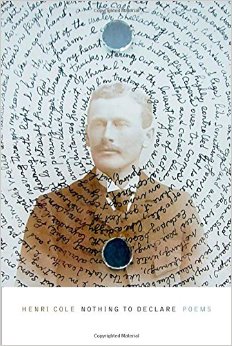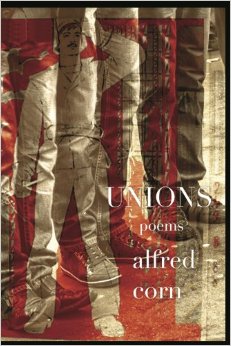Unions
by Alfred Corn
Barrow Street Press
82 pages, $16.95
UNIONS is Alfred Corn’s eleventh book of poetry, and it shows him as one of America’s most prolific and skillful poets. An urbane wit plays in virtually every line; a keen eye sizes up detail. Corn has a wonderful sense of history, of place, of situation, and he handles form with an aplomb few have mastered.
But all this skill would have just produced genial and sophisticated poetry if it weren’t for Corn’s rather haunting isolation. Something cuts him off from other people even as he approaches them. Take, for example, “Common Dwelling,” in which Corn records the sounds his neighbors make in his apartment house. He hears whispering through the bedroom walls, coffee grinding from the kitchen below, telltale footsteps in the hallway above, all of which turn the building into “a single body, limbs/ and nerves sending bulletins/ to the brain.” But the brain is “overloaded” and doesn’t know what to do with “this daily repeated/ and recklessly partial information.”
Contact and meaningful understanding are made impossible by the over-abundance of information, the viral load of ever-ramifying data. Even the love poems dramatize the difficulty of making contact. The extraordinary “Möbius Strip,” one of the finest and happiest poems in the book, ends with Corn and his partner entwined in lovemaking: “As both sides of our bodies’ Möbius/ strip become each other, you’ll soon be seeing/ me make my half-turn, trusting to meet your gaze.” Corn takes us almost to the moment of contact, but not quite. The lover “will soon be seeing” him, but he hasn’t yet. Corn needs to make a “half-turn,” and he does so “trusting to meet” the lover’s gaze. Inserting the word trusting raises doubts. There’s some uncertainty, and meeting the lover’s gaze is not performed head on, but only after making a “half-turn.” This Kama Sutra exercise brilliantly holds out the promise of fulfillment, but Corn is as yet cut off from meeting the lover’s gaze.
 Space Traveler
Space Traveler
by Benjamin S. Grossberg
University of Tampa Press
130 pages, $14.
IF CORN seems unable to make human connection, the space traveler of Benjamin S. Grossberg’s moving new book seems to be rocketing away from them. In the first poem, titled “Wandering,” we meet the space traveler who converts “parts/ of our bungalow into a ship,” using the siding “for the rocket body” and the chimney as “part of the nose cone.” His navigational instrument is a “combination of water heater/ and wet bar,” and his landing apparatus is springs he has “salvaged” from his bed. The space traveler is with another man, but they don’t seem very attached—“There wasn’t much/ of a goodbye,” and then he’s off, setting the “toaster for deep/ space. It didn’t ding for years.”
I’m not sure how I am supposed to take this Rube Goldberg contraption. Is it a metaphor of how we all get through life? Is the space traveler a Noah-figure, building an ark in his backyard to save him? Is this a poem about madness? Is it an amusing, campy version of Lost in Space? As if the original weren’t campy enough! It is in this ambiguity that Grossberg has his greatest effect. He makes me squirm not only because the poems are frequently sexily uncomfortable, but also because they deal with disturbing crosscurrents of emotions.
In the first of a series of poems sharing the title “Home,” it’s not clear whether the desire for home is a pull toward growth or death, leaving you in a field of corn or rolled up on the bathroom floor. Grossberg’s practice of giving several poems the same title is another way of disorientating us. Didn’t I read this before? I kept asking myself as I faced yet another one-stanza, one-page, short-lined poem. Yet I kept reading because, after all, we are all space travelers, even those—like me—who seem planted in our studies. We, too, feel the pull of the stars.
 Nothing to Declare
Nothing to Declare
by Henri Cole
Farrar, Straus & Giroux
70 pages, $23.
NOTHING TO DECLARE is Henri Cole’s finest and most disturbing volume. It is filled with poems that quickly move from pastoral calm to natural cataclysm. The first poem, “City Horse,” sets the mood for the book. It begins, “At the end of the road from concept to corpse,” and then goes on to describe the drowned body of a horse “with a bridle still buckled around her cheeks” that has drifted ashore “tied to a telephone pole.” In the midst of this “grotesque unbelievable landscape,” Cole bursts, “O, wondrous horse; O delicate horse,” a total break from the tone that preceded it, and to complicate the language he introduces the voice of a small boy who sobs enigmatically, “She was more smarter than me,/ she just wait.” We are left holding the fragments of this clash of language, voice, and perspective without resolution.
The same disconcerting mix appears in “Mother and Child,” which records the birth of some barnyard animal—pig, calf, or horse—it doesn’t matter. What matters is that “when she started to sweat, the baby—perfectly well-made—came quickly, groggy and gleaming from her insides.” Then comes an unexpected turn; the newborn calls “to mind remnants of defeated armies,/ fleeing slaves, and refugees herded across/ all the borders of the earth.” There’s something both creepy and correct about this vision of the newborn as defeated slave or refugee. What’s at stake is that nature is no less violent than humans. Both are brutish and nasty.
The closest to a love poem in the book is “Dog and Master.” The dog is not a canine, but the name for a male ermine that Cole caresses. But just as he thinks the ermine shows “civilization,” the beast bites him, and the two chase each other around the dining room, “stupidly/ loving, stupidly hating/ creatures in a violent/ marriage, or some weird/ division of myself.” For Cole’s poetry this internal warfare is necessary “in order to live.” His poems that seem so at odds with themselves are also written “in order to live.”
David Bergman is the author of the forthcoming book, The Poetry of Disturbance: The Discomforts of Postwar American Poetry.






